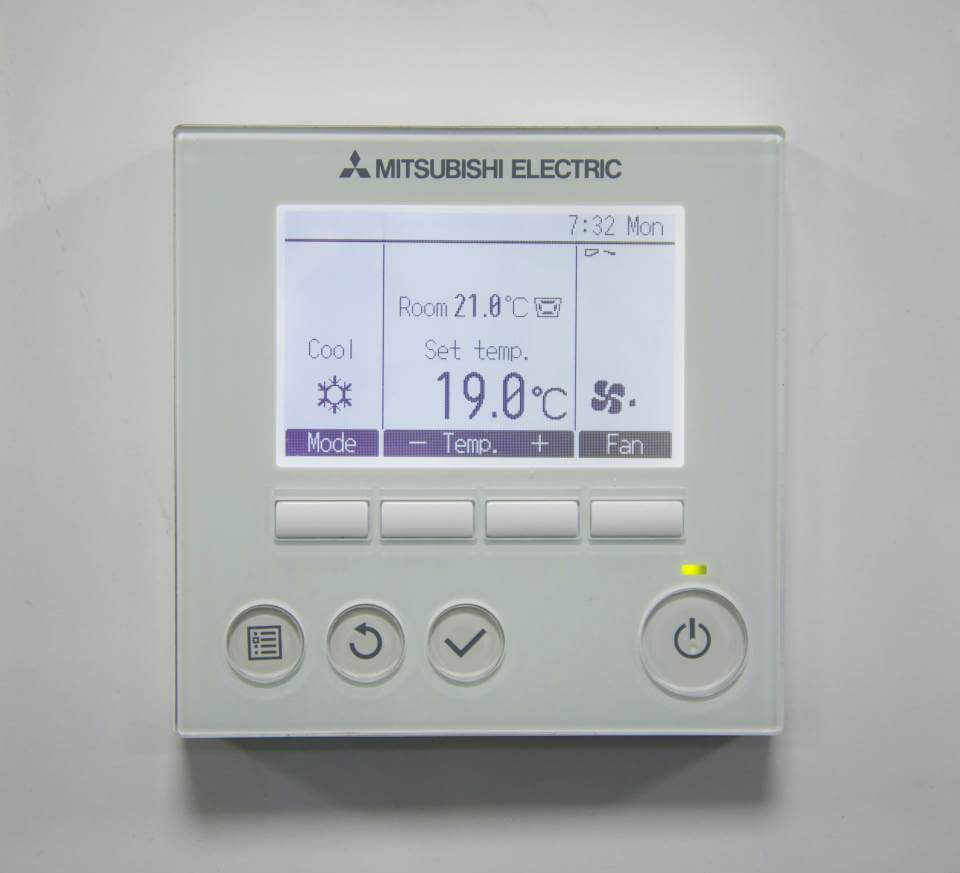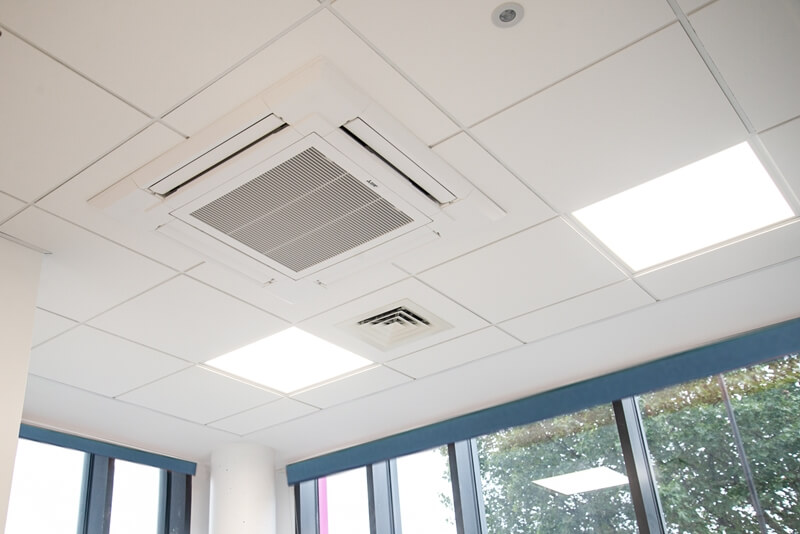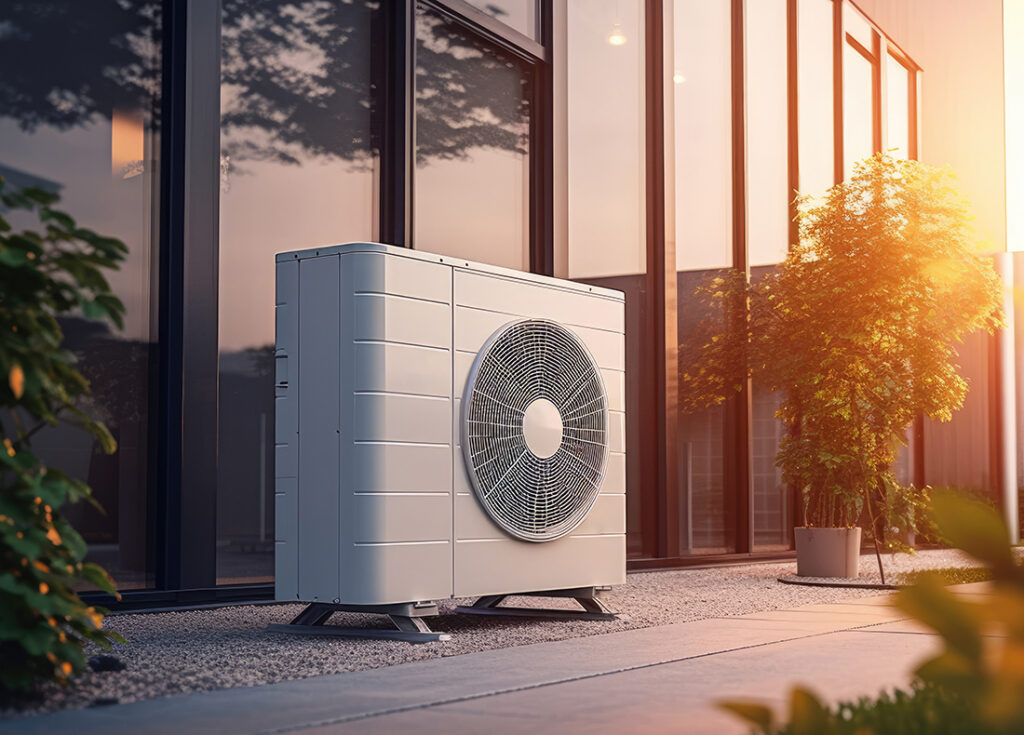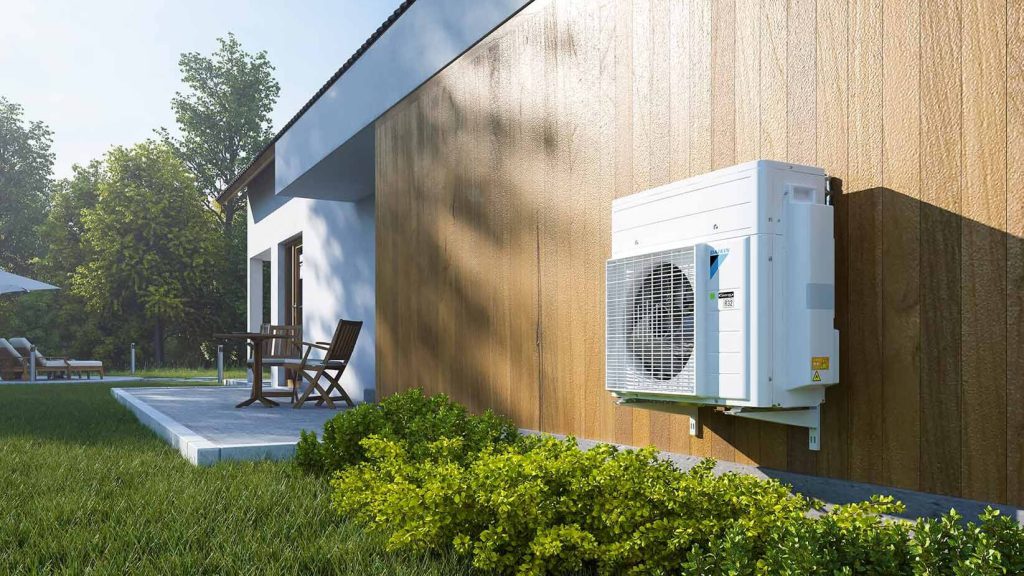Air Conditioning – Back To Basics
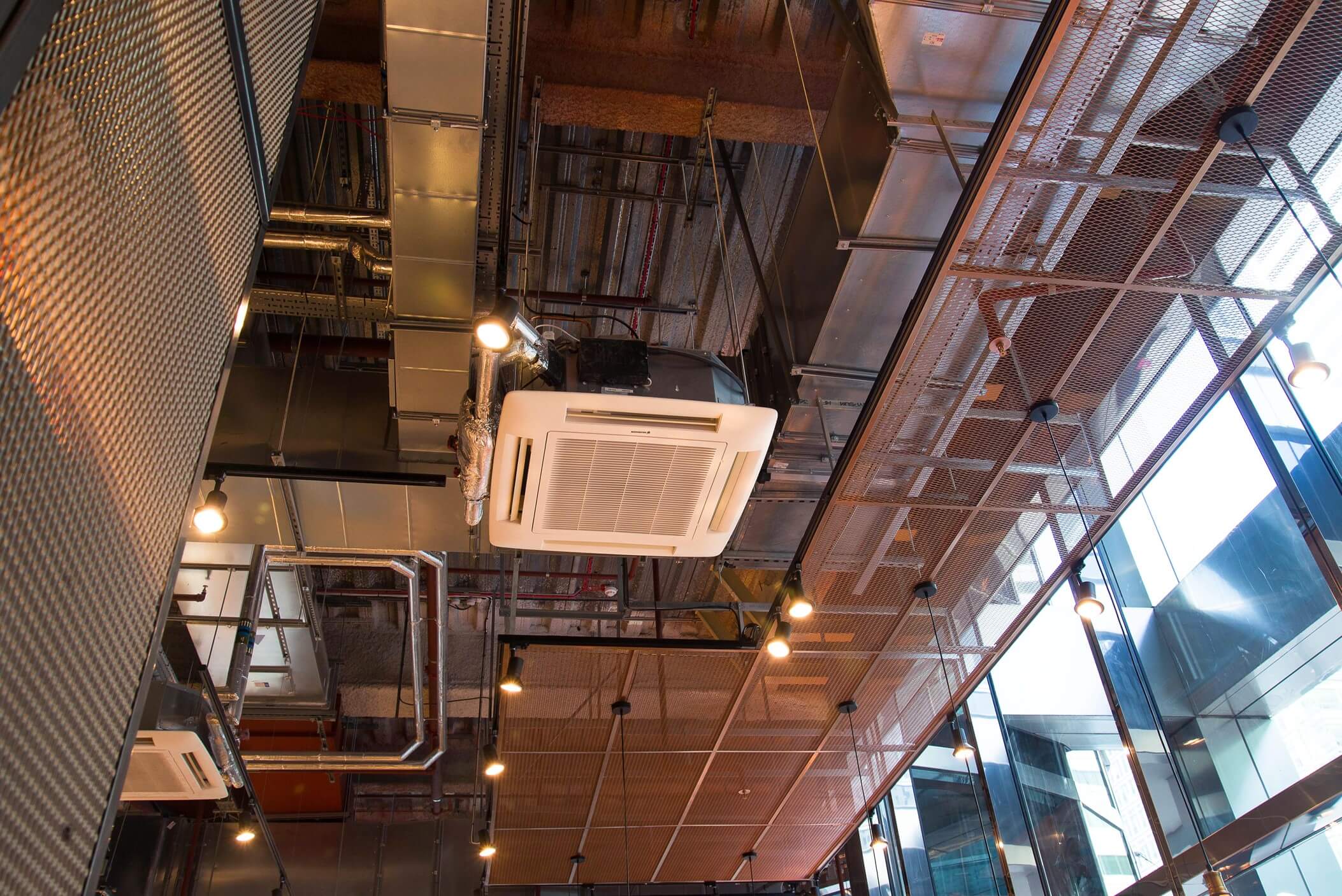
Estimated reading time 11 minutes
How often do you think about your air conditioning system? It’s all too easy to take our air conditioning for granted; after all it works seamlessly behind the scenes keeping our buildings and work environments cool or warm depending on the temperature outside. Like most other equipment around us we take it for granted until such times as it fails.
In this article we look at what air conditioning does, how air conditioning works, what air conditioning controls and the right air conditioning system for your business.
So what is air conditioning?
The Definition of Air Conditioning
Wikipedia defines air conditioning as “the process of removing heat and controlling the humidity of air in an enclosed space to achieve a more comfortable interior environment by use of powered 'air conditioners' or a variety of other methods including passive cooling and ventilative cooling. Air conditioning is a member of a family of systems and techniques that provide 'heating, ventilation, and air conditioning' (HVAC). “
The Oxford English Dictionary describes air conditioning as “a system for controlling the humidity, ventilation, and temperature in a building or vehicle, typically to maintain a cool atmosphere in warm conditions.”
How Does Air Conditioning Work?
Air conditioning is based on a simple scientific principle. When a liquid changes to a gas it results in the absorption of heat. Air conditioning uses this principle by pumping refrigerants through a compressor and forcing the refrigerant (which has properties enabling it to change at relatively low temperatures) to evaporate and condense again and again in a condenser in a closed system of evaporator coils. The refrigerant then transfers the heat from the inside air to the outside air maintaining the building at a steady temperature. The refrigerant then flows back to the compressor where the cycle starts over again.
Air Conditioning Controls Temperature, Humidity, Air Purification and Circulation
In order to maintain a comfortable working and living environment there are a number of factors that air conditioning must control. These are temperature, humidity, air purity and air circulation. In the simplest terms, air conditioning helps to provide a temperature and humidity controlled environment while filtering and purifying the air through circulation.
Temperature Control
Controlling the temperature is one of the important roles of an air conditioning system. The Chartered Institute of Building Services Engineers (CIBSE) Guide A: Environmental design recommends different temperatures depending on the kind of work being done e.g. 13°C for heavy work in factories, 16°C for light work in factories, 18°C in hospital wards and shops and 20°C in offices and dining rooms.
There are a number of advantages to controlling indoor temperature apart from the obvious one of providing a more comfortable working environment especially when the weather outside is either too cold or too hot. However temperature control goes beyond comfort. It also has an impact on health and productivity.
Health Issues
When the indoor temperature becomes too high there is a risk to health and safety. When it gets too hot the body starts to find it harder to regulate its internal temperature which can result in heatstroke if the blood temperature rises above 39°C. Above 41°C delirium and confusion can occur.
Rising temperatures can also cause dizziness, fainting, heat cramps, a loss of concentration and increased tiredness. When workers become tired they are more likely to take risks which increase the chance of accidents. Heat may also cause some workers to abandon or misuse protective gear as temperatures soar resulting in reduced protection.
Heat is known to aggravate some medical conditions such as high blood pressure and heart disease. Interestingly cold temperatures can also cause high blood pressure.
Productivity Issues
Worldwide research has shown how temperature plays a vital role in productivity. Much of this research has been carried out in offices but is just as applicable to other environments e.g.
- Facilities Management Journal (FMJ) survey showed that the wrong office temperature could be costing UK businesses as much as 2% of office hours which equates to approximately £13 billion annually (assuming an average wage of £26,500; 29.84m UK employees and a 228 day working year).
- Cornell University found that there were clear associations between office work performance and indoor environment conditions. Raising the temperature from 20°C to 25°C results in a reduction in energy consumption (less cooling), reduced costs, and reduced errors by 44%, increased output by 150% and savings of ~$2.00 per day per worker in lost productivity. Anything over or under these temperatures impacts productivity.
Humidity Control
Humidity isn’t something we often consider when it comes to our working environment. However it’s just as important when it comes to human comfort as we are very sensitive to humid environments. Just as air conditioning removes the heat from the air, it also dehumidifies the air.
Cooling Issues
We regulate our body temperature through perspiration. If the environment around is too humid its water content is higher and prevents us from releasing perspiration into the air as the air is already saturated. This blocks our natural ability to cool our body temperature and can lead to overheating. Overheating can result in heat exhaustion which in turn causes dizziness, confusion and nausea. The most comfortable humidity levels are between 30% and 50%.
Condensation Issues
While indoor air is maintained at a comfortable humidity it not only helps us to feel more comfortable by allowing us to cool down through perspiration, it also helps to reduce the amount of condensation within a building. The removal of water vapour from the air also makes buildings a less hospitable place for mildew and mould to grow.
If air conditioning systems didn’t control the indoor humidly there is a risk that mildew and mould could damage the building which if left unchecked could lead to major structural problems, which reduce the lifetime of a building and the furniture and equipment within it as building. Materials swell and shrink as they take on and lose water content e.g. changing moisture content can lead to shrinking in joists, stud walls and wood panelling and in some cases can cause plaster to crack.
Humidity encourages the growth of mildew and mould. This growth produces spores which can be allergens. The spores are small enough that they are invisible to the naked eye but they float round in the air and then attach themselves to other surfaces. Given the right conditions spores can form new mould colonies. Once a mould colony forms and releases spores it can cause a variety of symptoms including respiratory problems, itchiness and eye irritation.
Air conditioning also helps to stop the odours that accompany mould and mildew growth thereby preventing that “musty” or “rotting” smell that they produce within a building.
Air Purity Control
Like humidity, air quality probably hasn’t been something most people have spent a great deal of time thinking about, until recently. With the pandemic, air quality has been brought into sharp focus. We also know that the quality of the air we breathe can have a significant impact on our health and wellbeing.
Productivity Issues
Staff health and wellbeing has come to be recognised as being increasingly important for both staff and businesses.
According to The World Green Building Council Health and Wellbeing framework a company’s staff account for “90% of business operating costs, so even a 1% improvement in productivity can have a major impact on the bottom line and competitiveness of any business.” In their “Eight Features That Make Healthier and Green Offices” graphic indoor air quality and ventilation is the first listed feature. It shows that “healthy offices” have lower concentrations of CO2, VOCs (volatile organic compounds) and other pollutants, along with high ventilation rates. When an office is healthy there is an increase in cognitive scores for workers.
The Building Engineering Services Association (BESA) commissioned a YouGov survey which found that office workers believed poor air quality in their place of work was having a negative effect on their day-to-day productivity and well-being.
Of those surveyed:
- 68% of office workers experienced lapses in concentration on a monthly or more frequent basis
- 67% reported suffering from fatigue while at work on a monthly or more frequent basis
- 54% experienced decreased productivity on a monthly or more frequent basis
- 41% experienced watery or irritated eyes when in the office on a monthly or more frequent basis
In the survey 60% of workers also said they often open a window if they need fresh air. For many of us this would seem like a natural response to trying to improve indoor air quality however by opening a window you let in pollen, irritants and other toxins which are present outside.
BESA chief executive Paul McLaughlin also emphasised the point that “many people in the UK end up working more than 40 hours per week and, generally, we spend upwards of 90% of our time indoors. It is, therefore, crucial that buildings provide a healthy working environment.”
Health and Wellbeing Issues
Many health issues are associated with indoor air pollution and there is a great deal of research to back this up.
The UK government “Health matters: air pollution” guidance states that “poor air quality is the largest environmental risk to public health in the UK. Long term air pollution exposure can cause a variety of chronic illnesses including cardiovascular and respiratory diseases.”
The British Lung Foundation state that indoor air pollution is linked to an increased risk of various diseases including COPD, pneumonia and lung cancer as well as heart disease and stroke.
Asthma UK advise that “many common indoor pollutants are small enough to get into the lungs and make your asthma symptoms worse.”
According to Allergy UK “Allergy is the most common chronic disease in Europe. Up to 20% of patients with allergies struggle daily with the fear of a possible asthma attack, anaphylactic shock, or even death from an allergic reaction.”
The Royal College of Physicians published a report “Every breath we take: the lifelong impact of air pollution” which showed that looked at indoor and outdoor air pollution and found that there were 40,000 premature deaths a year in the UK caused by air pollution.
Research carried out the Confederation of British Industry (CBI) Economics on behalf of the Clean Air Fund found that by improving air quality the UK economy could benefit from £1.6bn annually through reducing 17,000 premature deaths and the amount of sickness days which in turn would lead to improving productivity. There would also be NHS savings as there would be fewer people with associated air pollution conditions.
Clearly being able to control temperature, humidity and air purity is vital to health and wellbeing and productivity. In order to take control of our indoor air - air conditioning is required.
The Right Air Conditioning For Your Business
There are many different types of air conditioning systems available. The right system will depend on the size of your building and which parts of the building need to be air conditioned. The following types of air conditioning are available:
Single Split
A single split air conditioning system utilises a single indoor air conditioning unit with an outdoor wall mounted unit. This type of system is suited to a small office, individual hotel room or classroom.
Multi split
A multi split air conditioning system utilises up to five indoor units with an outdoor unit. The indoor units can be wall mounted, ceiling cassette, ducted and vented. This type of air conditioner is recommended for average size businesses that have more than one office and meeting space that needs simultaneous heating and cooling.
VRV/VRF
A single VRF/VRV outdoor unit can accommodate up to 48 indoor units. The outdoor units are usually stored on a roof top. These systems are ideal for large commercial premises, such as hospitals, hotels, schools and large office blocks.
Your Heating, Ventilation and Air Conditioning Experts
Synecore are experts in air conditioning and heating, ventilation and air conditioning systems and can advise you on the best solution for your business premises. Synecore operate throughout Kent, London and the UK, providing commercial and industrial clients with the very best in HVAC systems and maintenance.
We supply top of the range air conditioning brand names, including Mitsubishi, Daikin and, Toshiba to offices, hotels, restaurants, retail and large commercial premises. Whether you require single split systems, multi split or a large VRV/VRF air conditioning system, we can provide you with the right air conditioning system solution.
Contact our team or call us on 01795 509 509. We’ll talk you through your options and provide you with expert advice.
